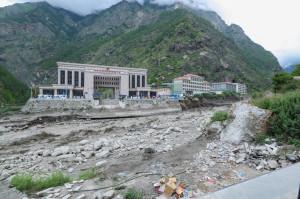Money
Trade barriers at top of Nepal’s agenda
Nepal will put trade barriers imposed by India on its exports at the top of the agenda when the commerce secretaries of the two countries meet for an Inter-Governmental Committee (IGC) meeting slated to start Tuesday in New Delhi.
Nepal will put trade barriers imposed by India on its exports at the top of the agenda when the commerce secretaries of the two countries meet for an Inter-Governmental Committee (IGC) meeting slated to start Tuesday in New Delhi.
Commerce Secretary Naindra Prasad Upadhyay is leading a 12-member team to hold discussions with Indian Commerce Secretary Rita Teaotia.
India has started imposing trade hurdles on Nepali processed leather and tea. India has compelled Nepali tea exporters to obtain quality test certification from an Indian laboratory each time they ship tea to India. Previously, Nepali tea exporters were allowed to conduct trade with multiple parties after receiving a quality check certificate valid for six months.
Exports of Nepali processed leather have come to a complete halt for the last three months after India’s Raxaul customs office banned the product. According to exporters, the Indian authorities have cited issues of animal quarantine for barring the entry of processed leather.
“As traders have been complaining about these issues, we will be raising them during the meeting,” said Rabi Shankar Sainju, joint secretary of the Commerce Ministry, before his departure.
The southern neighbour has long been imposing quantitative restrictions on vegetable ghee, acrylic yarn, zinc oxide and
copper products exported from Nepal as they have been included in the trade treaty between the two countries.
“We will be putting forward the removal of quota restrictions on these products as one of the main items on the agenda at the IGC meeting,” said Sainju.
Likewise, Nepali exporters have also been facing problems in exporting agricultural goods and medicinal products due to the need for certification.
The trade treaty signed between the two countries states that Nepali agricultural products can be exported to India at zero or nominal customs duty. Although Nepali exporters have been producing phyto-sanitary certification issued by domestic laboratories, the Nepali products have not been put in the positive lists by Indian customs.
India has been imposing countervailing duty on Nepali readymade garments, copper and brass utensils and kattha. Nepal has been requesting India to remove it at almost every IGC meeting, but it has never agreed to do so.
In addition, India has been charging 10-15 percent service tax on goods exported to Nepal. Commerce Secretary Upadhyay said Nepal would be requesting the Indian government to waive the service tax. “Besides, we will be requesting trade facilitation by removing all types of para-tariff and non-tariff barriers,” he said.
Easing quarantine procedures on exports of agricultural goods, finalising the transhipment modality in customs clearance and early construction of Integrated Check Posts (ICPs) in Nepal will also be on the agenda.
Currently, goods imported from third countries are required to be cleared through Indian customs in Kolkata. After the implementation of the transshipment modality, the imported goods can be cleared at the Nepal-India border. India has agreed in principle to enforce the transshipment modality.
Nepal will also be asking India to operationalise bulk cargo at other border points besides Birgunj. The southern neighbour has also agreed to expedite the Kolkata/Haldiya-Jogbani-Biratnagar and Kolkata/Haldiya-Nautanwa/Sunauli-Bhairahawa rail routes for bulk cargo.
Likewise, Nepal will also be asking India to ease cross-border banking services for traders. At present, Nepali traders
cannot transfer more than IRs50,000 via Indian banks. Similarly, they have to go through a lengthy process to open accounts in Indian banks.
The IGC committee was constituted under the Nepal-India trade treaty. Committee meetings provide a platform for resolving various trade related issues and discuss enhancement of bilateral trade. The last meeting of the IGC was held in Kathmandu from December 21-22, 2013.




 22.75°C Kathmandu
22.75°C Kathmandu













